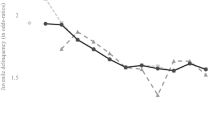Abstract
Three studies tested the hypothesis that an individual acting alone, compared with an individual group member, would be held more responsible for behavior leading to a negative consequence. In one study, 240 subjects read scenarios of an event with a negative outcome involving one, two, three, or four individuals. As predicted, there was a significant inverse relationship between the number of participants and the degree of attributed responsibility. The second study investigated subjects' attributions of responsibility for criminals committing a crime alone or with a partner. Single perpetrators were considered more responsible than those acting with a partner, although there was no difference in sentence length assigned. In the third, archival-type study, prison sentences for criminals who had actually committed a robbery alone or with others were examined. Again, there was diffusion of responsibility: criminals acting alone received significantly longer sentences than perpetrators who had committed a similar crime, but who had acted with others.
Similar content being viewed by others
References
Bem, D. J. Self-perception theory. In L. Berkowitz (Ed.),Advances in Experimental Social Psychology, Vol. 6. New York: Academic Press, 1972, pp. 1–62.
Code of Virginia, 1950, Annotated, Vol. 4-A. Charlottesville, Virginia: The Michie Company, 1975.
DeJong, W., Morris, W. N., & Hastorf, A. H. Effect of an escaped accomplice on the punishment assigned to a criminal defendant.Journal of Personality and Social Psychology, 1976,38, 374–384.
Hagan, J. Law, order and sentencing: A study of attitude in action.Sociometry, 1975,38, 374–384.
Hart, H. L. A., & Honore, A. M.Causation in the Law. Oxford: Clarendon Press, 1959.
Kelley, H. H. Attribution theory in social psychology. In D. Levine (Ed.),Nebraska Symposium in Motivation, 1967, Vol. 15. Lincoln, Nebraska: University of Nebraska Press, 1967.
Latané, B., & Darley, J. M.The Unresponsive Bystander: Why Doesn't he Help? New York: Appleton-Century-Crofts, 1970.
LeBon, G.Psychologie des foules. Paris: F. Olean, 1895. (TranslatedThe Crowd. London: T. Fisher Unwin, 1896).
Myers, J. L.Fundamentals of Experimental Design. Boston: Allyn & Bacon, 1966.
Mynatt, C., & Sherman, S. J. Responsibility attribution in groups and individuals: a direct test of the diffusion of responsibility hypothesis.Journal of Personality and Social Psychology, 1975,32, 1111–1118.
Pepitone, A. Social psychological perspective on crime and punishment.Journal of Social Issues, 1975,4, 197–216.
Sellin, T., & Wofgang, M.The Measurement of Delinquency. New York: John Willey, 1964.
Slovic, P., Fischhoff, B., & Lichtenstein, S. Cognitive processes and societal risk taking. In J. S. Carroll & J. W. Payne (Eds.),Cognition and Social Behavior. Hillsdale, New Jersey: Lawrence Erlbaum Associates, 1977.
Walster, E., Berscheid, E., & Walster, G. W. New directions in equity research. In L. Berkowitz and E. Walster (Eds.),Advances in Experimental Psychology, Vol. 9. New York: Academic Press, 1976, pp. 1–42.
Zimbardo, P. G. The human choice: Individuation, reason, and order versus deindividuation, impulse, and chaos. In W. J. Arnold & D. Levine (Eds.),Nebraska Symposium on Motivation, 1969. Lincoln: University of Nebraska Press, 1970, pp. 237–307.
Author information
Authors and Affiliations
Additional information
We are grateful to Charles Davis, who collected the data for Experiment III, and to the office of the Richmond, Virginia, Commonwealth's Attorney for providing access to their files.
About this article
Cite this article
Feldman, R.S., Rosen, F.P. Diffusion of responsibility in crime, punishment, and other adversity. Law Hum Behav 2, 313–322 (1978). https://doi.org/10.1007/BF01038984
Issue Date:
DOI: https://doi.org/10.1007/BF01038984




